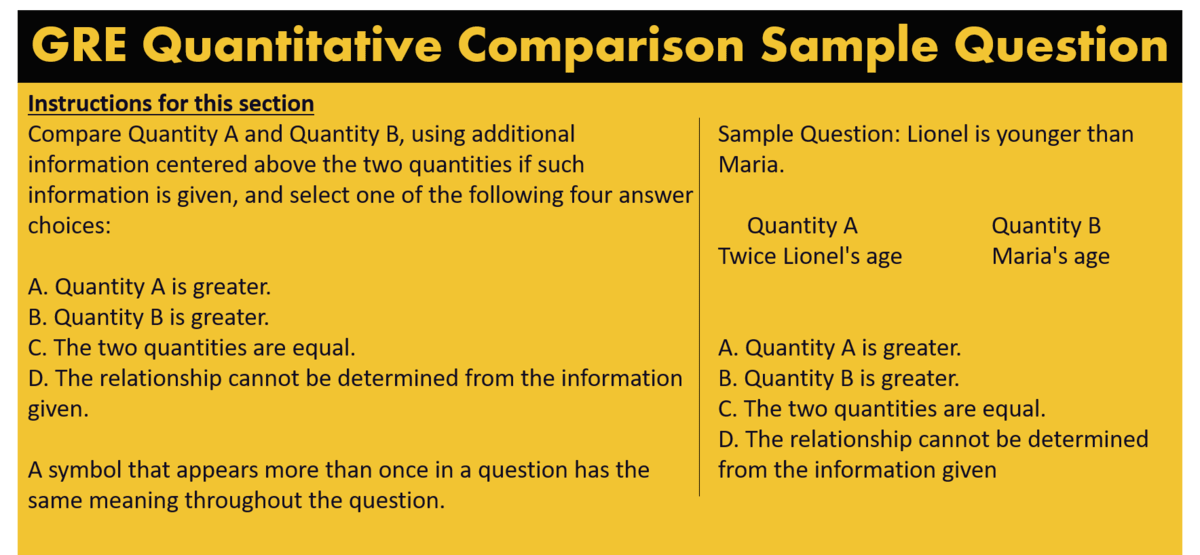

Quantitative Comparison Questions - You will be given a piece of information, followed by two quantities (A and B).Ultimately, this section is making you ready for a world-class master’s program. Multiple-choice questions - select one or more answer choicesĮach type of question is designed to test your basic mathematical skills and your ability to reason quantitatively.Multiple-choice questions - select one answer choice.The GRE Quantitative Reasoning contains four (4) different question types. What are the types in GRE Quantitative Reasoning? Data Analysis - includes basic descriptive statistics like the mean, median, mode, range, etc., followed by interpretation of data in tables and groups, probability and so on.ĭon’t confuse these topics with critical thinking skills or with any other essay section that leads to some GRE issue.Geometry - includes parallel and perpendicular lines, circles, triangles, equilateral and 30°-60°-90° triangles, congruent and similar figures, area, perimeter, and so on.Algebra - includes factoring and simplifying algebraic expressions, linear and quadratic equations and inequalities, coordinate geometry, including graphs of functions, equations and inequalities, etc.Arithmetic - includes properties and types of integers, prime numbers, remainders arithmetic operations, exponents and roots, etc.In addition, the GRE quants section uses mathematical concepts (below) to test your skills, concepts and abilities. These questions are based on the data from the tables, graphs, etc. If it appears as sets of questions, then they are called the Data Interpretation set. Multiple-choice Questions - Select One or More Answer ChoicesĮach question from the above question type appears independently or as a set of questions.Multiple-choice Questions - Select One Answer Choice.GRE Quantitative Reasoning SyllabusĪccording to ETS, the GRE Quantitative Reasoning syllabus includes four different types of questions: Like verbal and analytical writing (awa), the GRE Quants section contains 4 question types, where students who master them will get a good GRE score of 160+ out of 170. GRE Quantitative Reasoning is a part of the GRE General Test, which assesses your basic mathematical skills and ability to reason quantitatively and tackle problems using quantitative methods. To get the latest syllabus, practice questions with answers, key topics, etc., go through this entire blog. Quantitative Reasoning is different from Verbal Reasoning and Analytical Writing mainly for its math skills and concepts. It’s a standardized exam, having GRE Quantitative Reasoning and two other sections. If you want to pursue your favourite master’s program in countries like Canada, the US, etc., you must take the GRE General test conducted by ETS. You don't want to waste valuable test time deriving results.GRE Quantitative Reasoning is one of the tests in GRE, where millions of students take this GRE test to study for a master’s degree in top universities. October (less than 2 weeks to exam): Memorize equations.

Go to the Ohio State website where they have compiled the questions from past exams by topic. September/October (last month to exam): At this point you've taken all the practice exams, so you hopefully only have a few topics that you still have issues with. Do a very detailed grading, keep careful note of topics you still need to review. I told you to save this for last since it is the most similar to the current exam. If you followed the above steps, it should be the 2008 exam. Grade and review.Įarly September (5 weeks to exam): Take your last remaining practice exam. Grade and review.Īugust (2 months to exam): Time for another practice exam. July (3 months to exam): Time for another practice exam. June (4 months to exam): Take another practice test under test conditions. Open up your textbooks from undergrad (you did buy them all right? And didn't sell them back?) and review the topics that you are rusty on (as determined by the past exam results) Review the correct solutions to problems at GRE Physics. The point of taking a practice test without any preparation was to provide motivation for you to study throughout the summer. If you felt good about the exam and liked your score, you can ignore the rest of my advice. Force yourself to sit down and take it under test like conditions. May (5 months to exam): Take a practice test. This plan is for someone taking the exam in October, so adjust the dates accordingly for a different exam date. This is an ideal plan, one that I did not follow but wish I had. If you want a less detailed study plan, check out my advice below. If I had to take the exam again, I would follow this site closely! If you want an extremely detailed study plan, definitely check out the great website from a study group at the Astronomy department of the University of Washington.


 0 kommentar(er)
0 kommentar(er)
